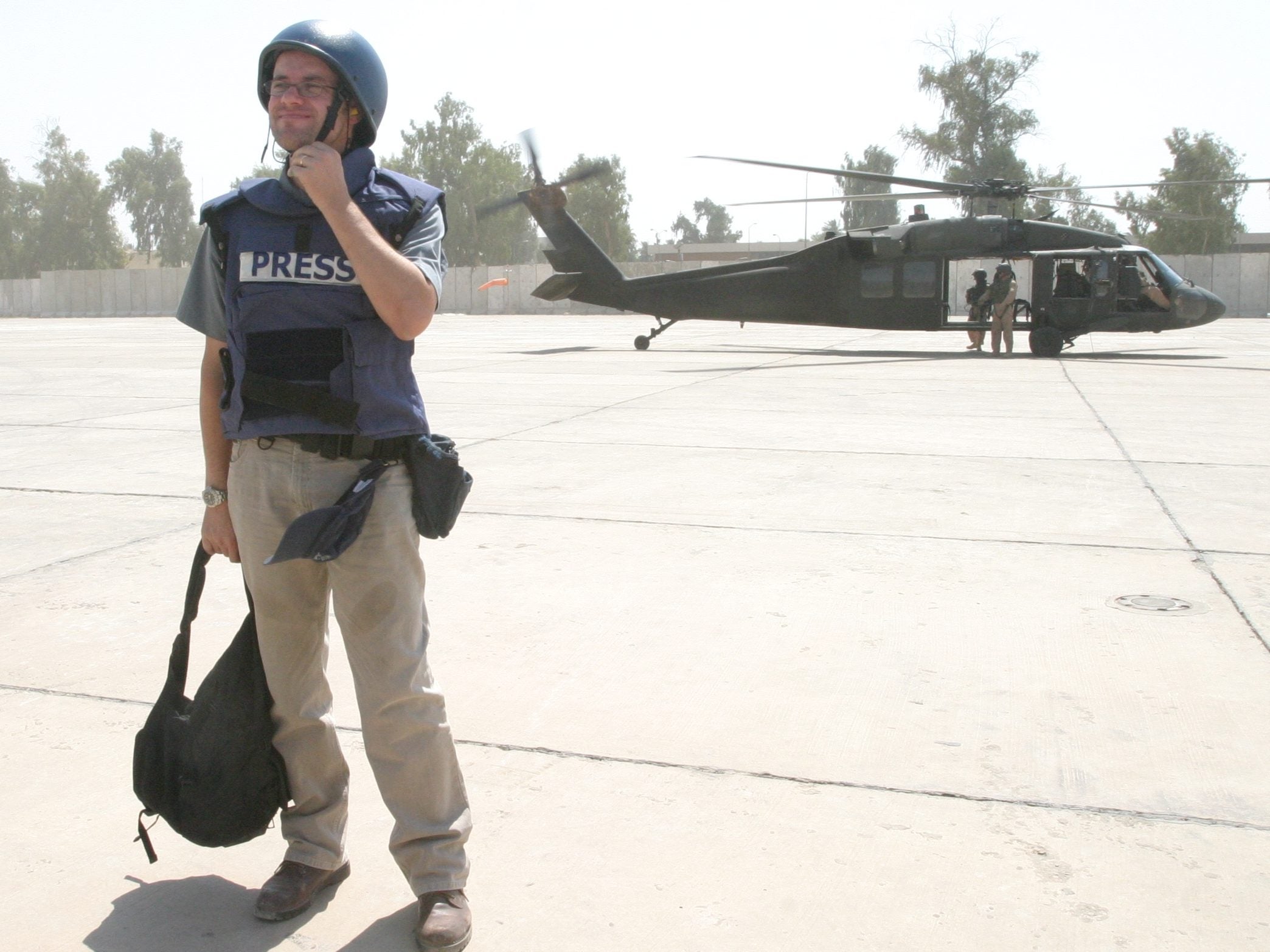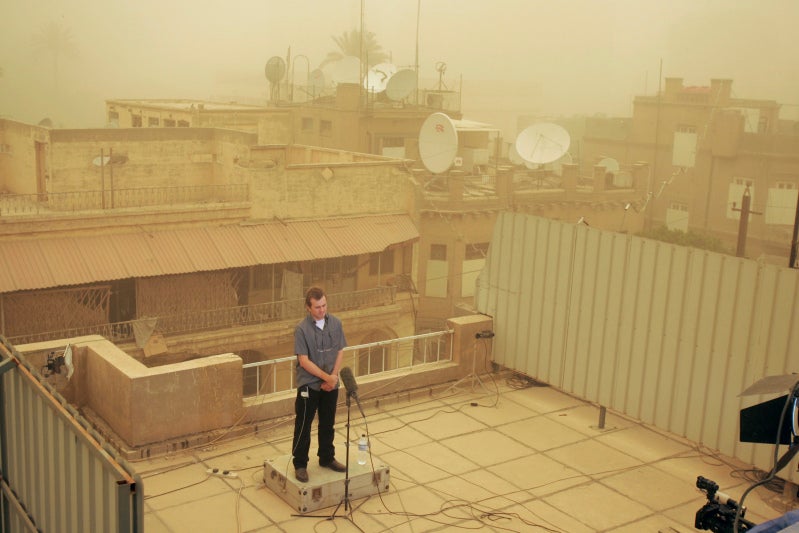
A former Reuters bureau chief diagnosed with post-traumatic stress disorder has been appointed to a new mental health advocacy role within the global news agency.
Dean Yates (pictured) was named journalist mental health and wellbeing advocate at in May and has been opening up conversations about mental health with Reuters staff worldwide.
“I want to create a climate in Reuters where journalists feel comfortable coming to their managers with mental health issues and managers in return will treat those journalists with empathy,” he told Press Gazette.
Yates, 49, first joined Reuters in 1993 at its bureau in Jakarta, Indonesia. There he reported on the Bali bombings in 2002 and the Boxing Day tsunami in 2004, the latter claiming thousands of lives.
While Yates was Iraq bureau chief from 2007-8, two Reuters news staff were killed in an attack by a US Apache helicopter whose pilots mistook the reporters for insurgents.
Gunship footage of Namir Noor-Eldeen, 22, and his assistant and driver Saeed Chmagh, 40, later made headlines when it was leaked by Wikileaks and published online.
Last year, Yates was diagnosed with post-traumatic stress disorder (PTSD) as well as what is known as “moral injury” – where a past action, or inaction, damages a person’s moral conscience.
“In my case, I lost two of my staff and I feel culpable over their deaths,” he said. “I feel guilt and shame associated with that – it’s very complex.”
Yates said moral injury was “virtually unheard of in the media industry” but was an issue it needed to be “much more aware of”.
He said some reporters covering the refugee crisis on boats and beaches in Europe have been diagnosed with moral injury.
“Confronted day after day with this suffering and tragedy, and people having drowned, and in many instances they might be the only ones on the beach – so do they help, or take pictures? What’s their role?” he said of the difficulties facing journalists covering the issue.
Yates said he believed his “experience on the ground” as a reporter and “live experience of mental illness” meant he would be able to bring about change in a news organisation as big as Reuters.
He said among his tasks was normalising mental health issues in the newsroom, which he has begun to tackle by writing blogs on various issues that are sent internally to all staff, some of whom have also contributed their own blogs on mental health.
“These blogs are really resonating throughout our editorial team,” said Yates. “It’s driving conversation about mental illness. It’s starting to make it, hopefully, work for our journalists to talk about these issues.”

Dean Yates stands on the roof of the Baghdad bureau as he does a live rehearsal with the New York office as part of events marking the first day of Thomson Reuters (April 17, 2008). Picture: Reuters/Mahmoud Raouf Mahmoud
Yates said it was while being treated at a psychiatric facility and there speaking to people from other professions who had “no support” that he was moved to do something for the news industry.
“I just made me feel like if I can get my recovery on track then maybe there’s something I can do to help my own folks, i.e. journalists,” he said.
Later he pitched the idea to senior editorial management in New York, who helped outline the role. Yates said he believes his new post to be a first among major news organisations.
Yates, an Australian who lives in Tasmania, said he aimed to provide training to managers, improve communication about mental health issues and teach journalists techniques to self-care.
Reuters has had a trauma support programme for 11 years, but Yates said he wanted to “bring more of it in house so that managers are aware of the signs and symptoms of PTSD, so they can spot them and maybe have a conversation with journalists if they feel they are suffering.
“Or maybe the journalist themselves will feel comfortable putting their hand up and saying I need help.”
He said the news industry could be a “macho place” and that journalists often “don’t want to acknowledge that they are struggling”, adding: “They think if they raise a hand and say they are struggling with mental health illness it might jeopardise their employment.”
He said he was aiming to get mental illness to be treated the same as a physical injury in the workplace.
Yates said a “really important aspect” of mental health awareness was “vicarious trauma”. This is where a person is affected by a traumatic incident even though they have not experienced it directly.
Journalists can experience trauma by seeing graphic images or videos of atrocities and natural disasters, or hearing harrowing accounts from victims and survivors.
As Press Gazette reported earlier this month, vicarious trauma has become an area of increasing concern as high-quality footage is now often shared on social media by eye-witnesses to a tragedy, which is then picked up by reporters.
Another issue Yates pointed to as affecting mental health within the wider press industry was that of “burnout”.
He said: “We live in this highly connected world, 24/7 cycle. They [journalists] are always on hyper-alert for the next breaking story and checking what’s being said on social media, so I think it’s very difficult for journalists to switch off and the research is unequivocal that when people don’t switch off that’s when they get burnout.
“People wake up in the middle of the night and check their emails. Because of technology the way we do journalism has changed a lot and a lot of that is for the better, but it has meant that journalists find it very difficult to switch off and get that work-life balance right and that’s something we need to address.”
He said changing practices, such as getting bosses not to send emails to staff on weekends unless it’s a really big story, and keeping phones out of the bedroom when not on call, were among measures that would go some way to giving journalists an opportunity to switch off.
Yates said he was hoping to make Reuters a model for other media organisations to follow but that it was a “long-term project” and might take a “few years” to bed in best practice.
Picture: Supplied
Email pged@pressgazette.co.uk to point out mistakes, provide story tips or send in a letter for publication on our "Letters Page" blog






